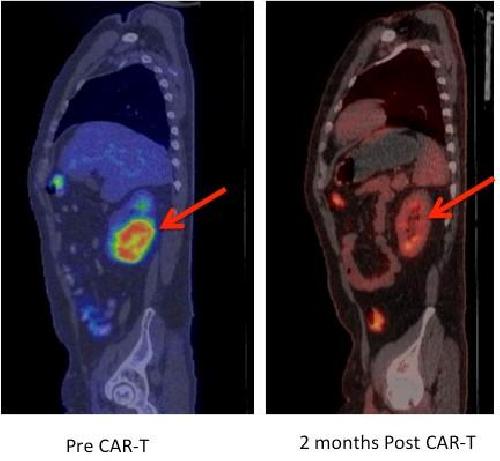(SEATTLE) - Dr. Stanley Riddell, an immunotherapy researcher and oncologist at Seattle's Fred Hutchinson Cancer Research Center, on Feb. 14 will present an update on new adoptive T-cell strategies for cancer at the annual meeting of the American Association for the Advancement of Science in Washington, D.C.
His 8 a.m. EST presentation will be part of a symposium on the promise and progress of T-cell therapy to fight human diseases. For more than 25 years, Riddell has pioneered experimental therapies that modify and empower the immune system to effectively treat cancers and infectious diseases.
In preliminary results of clinical trials using the latest version of an experimental immunotherapy - T cells engineered with chimeric antigen receptors, or CARs - Riddell and his colleagues have seen "sustained regression" in many previously relapsing and treatment-resistant cases of B-cell malignancies: acute lymphoblastic leukemia, Non-Hodgkin lymphoma and chronic lymphocytic leukemia. CARs are synthetic receptors that are delivered and linked to T cells by gene transfer techniques to redirect T-cell recognition to cancer cells. By introducing the CARs into specialized subsets of T cells, a potent and long-lasting immune response against the tumor can be achieved.
 This is a regression of chemotherapy-refractory lymphoma after CAR T-cell therapy. Positron emission tomography (PET) images showing large tumor mass in the kidney (red arrow) prior to CAR-T cell therapy that completely regressed on a repeat PET scan performed 2 months after CAR-T cells. Credit: Fred Hutch News Service
This is a regression of chemotherapy-refractory lymphoma after CAR T-cell therapy. Positron emission tomography (PET) images showing large tumor mass in the kidney (red arrow) prior to CAR-T cell therapy that completely regressed on a repeat PET scan performed 2 months after CAR-T cells. Credit: Fred Hutch News Service
The studies are funded by Juno Therapeutics, which was initially formed on technology from researchers at Fred Hutch, Memorial Sloan-Kettering Cancer Center and Seattle Children's Research Institute to commercialize promising immunotherapies.
"The merging of gene therapy, synthetic biology and cell biology is providing new treatment options for patients with refractory malignancies and represents a novel class of therapeutics with the potential to transform cancer care," Riddell said. "In the laboratory and in clinical trials, we are seeing dramatic responses in patients with tumors that are resistant to conventional high-dose chemotherapy."
T cells are white blood cells that detect foreign or abnormal cells, including cancerous ones, and initiate a process that targets the invaders for attack. But even when triggered, the natural immune response to a tumor often is neither potent nor persistent enough to vanquish cancer cells: T cells become exhausted or tumors evade them by imposing regulation that can limit the effectiveness of attack by T cells present in the patient.
Adoptive T-cell transfer is an experimental immune-boosting process in which immune cells are engineered to recognize and attack the patient's cancer cells. Researchers extract T cells from the blood and use gene transfer to introduce highly potent receptors that target the cancer cell. In less than two weeks, the new cells are infused into the patient where they can home to the tumor site and destroy the cancer cells.
Riddell and his colleagues constantly refine the process. They recently revised their CAR T-cell treatment protocols to increase effectiveness and reduce negative side effects, which can include neurological symptoms and "cytokine release syndrome," with fevers and drops in blood pressure. Meanwhile, scientists in his lab are working to modify the technology to apply it to a wider range of cancers, and they are developing the next generation of engineered T cells, which are expected to be safer and easier to design.
In his AAAS presentation, Riddell will discuss these and other recent advances and outline steps researchers are taking to improve targeting and reduce side effects. His lecture, "Engineering T Cells for Safe and Effective Cancer Immunotherapy," is one of three that will be presented from 8 to 9:30 a.m.
Also at the symposium, Dr. Dirk Busch, an infection immunology researcher at the Technical Institute of Munich, Germany, will discuss cell-processing technologies and a preclinical study aimed at safeguarding against treatment-related toxicity. Chiara Bonini, a research scientist in the Cancer Immunotherapy and Gene Therapy Program at San Raffaele Scientific Institute, Milan, Italy, will provide a presentation on a T-cell receptor gene-editing technique designed to improve therapeutic effectiveness while reducing toxicity risk.
source: Fred Hutchinson Cancer Research Center